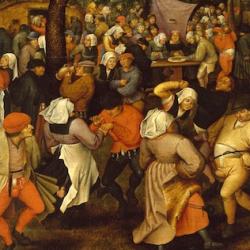John C. Peckham addresses the long-standing question of whether God’s love is conditional or unconditional in his recent The Love of God: A Canonical Model. Peckham doesn’t think that either is a good summary of the whole biblical picture. He prefers to talk about the “foreconditionality” of God’s love, and the reciprocal nature of God’s love.
As foreconditional, God’s love is prior to all human response. God’s love initiates all love (200): “Humans would not exist, let along be beneficiaries of divine love, but for the free decision of God to create and sustain us. . . . Since divine love is a gift, creatures cannot earn it. Divine love toward humans is always undeserved.” Yet this doesn’t mean that God’s love is “indifferent or strictly unconditional.” He “can and does reward appropriate (albeit imperfect) human response. God’s unmerited love, then, does not nullify conditions, evaluative judgment, justice or reciprocity. . . . God’s love is bestowed prior to conditions and is undeserved, yet there are conditions for its continuance” (202-3).
One of the consequences of this position is that it’s possible to have and then to lose God’s love. As Peckham points out, this is explicitly stated in various places: “God’s hesed is repeatedly characterized as everlasting (Jer 33:11; Psalm 136) on the one hand, and yet it may be forfeited and withdrawn (Jer 16:5; Compare Ps 77:8; 88:11; 89:49). Divine hesed is extremely steadfast, reliable and enduring, and yet. . . ‘God’s hesed is conditional, dependent upon the good repait of the covenant relationship that it is up to Israel to maintain’ . . . Thus divine hesed is ‘from everlasting to everlasting on those who fear him’ (Ps 103:17)” (83-4, quoting Katherine Sakenfeld). In Hosea 9:17, Yahweh says “I vame to hate them there” and “I will love them no more.” Jeremiah 16:5 says, “I have withdrawn My peace from this people, My lovingkindness and compassion” 196). Jesus promises love from the Father and Son to those who love and obey Him (John 14:21, 23; 16:27), and urges His disciples to remain in His love by keeping His commandments (John 15:9-10).
Elsewhere, referring to Jeremiah, he qualified this by noting that “the people continue to be viewed as God’s ‘beloved,’ yet the love relationship is ineffective and broken. Thus it appears that divine benevolence, which stems from God’s foreconditional love, is maintained, while his beneficence is interrupted by the beloved’s apostasy. In this way, foreconditional divine love is subject to conditions within the actual history of the relationship” (198).
I don’t buy all the implications of Peckham’s foreconditional-reciprocal model. Among other things, more attention to pneumatology would change the picture somewhat: God looks for fruit (conditionality) but the Spirit produces the fruit God seeks; God crowns His own works (Augustine). If I were to unpack that, my formulas would become too “deterministic” for Peckham.
Still, he’s absolutely right in His claim that God’s love demands reciprocity, and that when His love is met with indifference or hostility, God may withdraw: “God never removes his love from anyone who wishes to receive his love. However, the object(s) of God’s love may reject intimate relationship with God and, if persistent in such a rejection, forefeit reception of divine love altogether. . . . If I finally spurn God’s love, his love may continue to shine like the rays of the sun, but, by my own decisions, I am completely shaded from its light and warmth as if I have locked myself in a windowless basement” (213).















